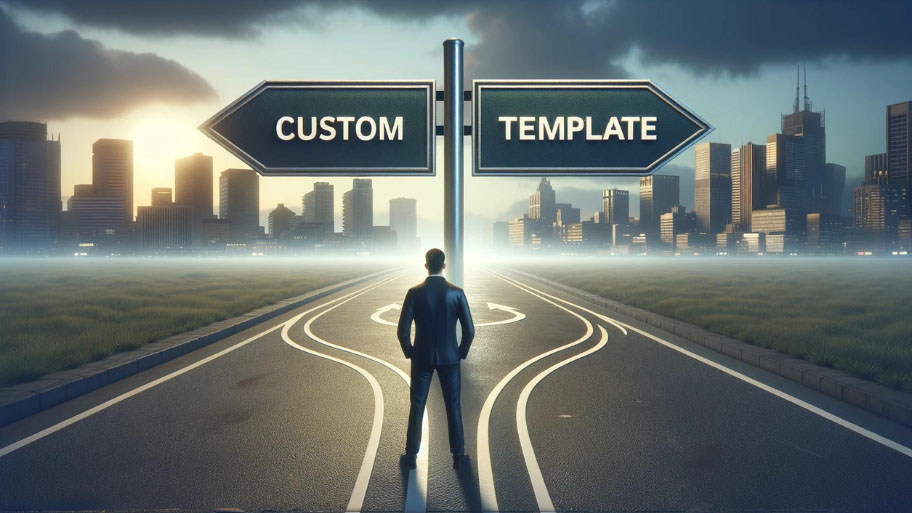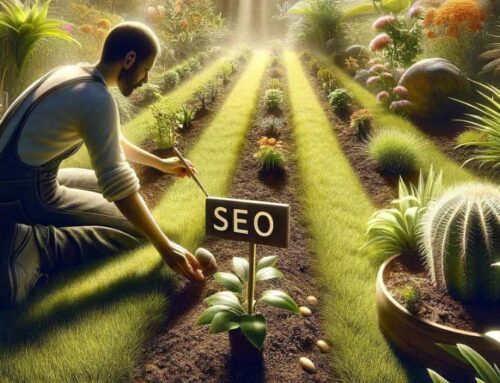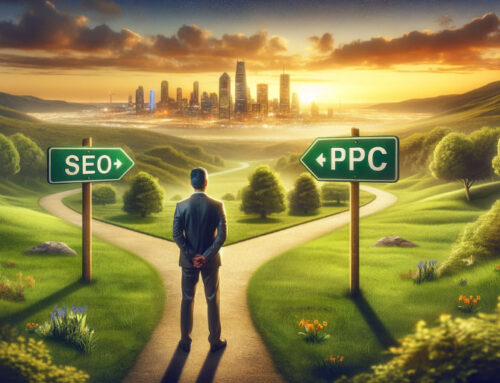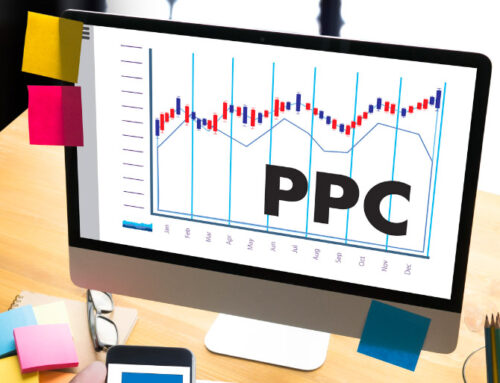In today’s digital age, the decision between opting for a custom website or a template-based solution is a common dilemma faced by business owners and marketing professionals nationwide. This choice often sparks debates in boardrooms and marketing meetings, as it’s not just about aesthetics but the impact on your brand’s online presence.
While some may view website templates as a convenient and cost-effective solution, others argue that custom websites offer unparalleled uniqueness and functionality tailored to specific business needs.

Understanding the difference and making the right choice can significantly influence your business’s digital footprint.
Here, we’ll explore the essential considerations that should guide your decision, ensuring your website aligns perfectly with your business objectives and audience expectations.
Website Templates vs. Custom Design
Navigating the choice between custom and template websites involves weighing several key factors. Each option offers distinct advantages and challenges, from budget constraints to scalability needs. Let’s delve into these considerations to help you make an informed decision that aligns with your business goals.
1. Budget Considerations
When it comes to establishing or revamping your online presence, budget plays a pivotal role. Here’s a breakdown of how custom and template websites stack up financially:
Summary: Your budget not only influences your choice between a custom and a template website but also impacts the potential for growth and scalability. A template website might be the right choice for businesses looking for a cost-effective, quick launch.
However, for those prioritizing brand uniqueness, customer engagement, and long-term scalability, investing in a custom website could offer more substantial benefits in the long run.
2. Time to Launch
Deciding how quickly you want your website up and running is also a big deal. Let’s break down what it means for your timeline when you’re choosing between a custom design and using a template:
Summary: In short, if getting your site live quickly is top of your list, a template could be the way to go. But if you’re all about making a site that’s 100% you, and you’ve got the time to spare, custom could be your dream come true. It’s all about balancing how fast you want to move with how unique you want your site to be.
3. Brand Identity and Customization
Your website is often the first point of contact between your brand and potential customers. How it looks, feels, and operates can significantly impact their perception of your business. Here’s how both custom and template websites measure up in terms of brand identity and customization:
Summary: The choice between custom and template websites for brand identity and customization boils down to the level of uniqueness and flexibility your brand requires. Custom websites stand out for businesses aiming to make a strong, individual statement online, while templates offer a quick and cost-effective solution for those willing to navigate within predefined boundaries.
4. Functionality and Performance
When it comes to making your website work for you, it’s all about finding the right fit for your brand’s vibe and your audience’s needs. Let’s break down the nitty-gritty of how choosing between a custom design and a template impacts what your site can do, how fast it loads, and how much your visitors enjoy the experience.
Summary: Choosing between custom and template isn’t just about looks; it’s about how well your site meets your needs, delights your visitors, and supports your growth. Whether you’re crafting a unique experience with a custom site or getting up and running fast with a template, the goal is the same: a website that feels like home to your visitors and brings your brand to life.
5. Flexibility and Scalability
In the evolving world of digital business, the ability of your website to grow and adapt alongside your company is not just an advantage—it’s a necessity. This section focuses on the flexibility and scalability of custom versus template websites, ensuring we build on what’s been discussed without repetition.
Summary: Choosing between a custom and a template website involves considering not just where your business is today, but where it aims to be in the future. If your vision involves significant growth, evolving services, or a need for distinctive features, investing in a custom website could provide the foundation your business needs to thrive.
Conversely, for those with immediate needs and limited resources, a template website offers a viable starting point, with the understanding that future growth might necessitate a more flexible and scalable solution.
Choosing between a custom web design and a template isn’t just about today’s needs; it’s about setting your brand up for success down the road.
Understanding the Basics
Let’s simplify things a bit. Imagine you’re at a crossroads: one path leads to a custom-built home designed just for you, while the other to a pre-built house that’s ready to move into. This is similar to choosing between a custom website design and using a website template for your business’s online home.
What is a Custom Website Design?
Think of a custom website design as commissioning a piece of art. It’s created from the ground up to fit your brand like a glove. Here’s why it might just be the perfect fit for your business:
Choosing a custom website means creating a unique space that truly reflects your brand. It’s ideal for those looking to stand out and grow their online presence with a site that’s as dynamic as their business. If you want a website that speaks directly to your audience and showcases your brand’s uniqueness, a custom design is your go-to choice.
Switching gears to website templates, let’s explore this accessible and efficient route to launching your online presence. Website templates offer a straightforward path to getting your site up and running, ideal for those keen on speed and simplicity without compromising on quality.
What is a Website Template?
A website template is essentially a pre-designed webpage, or set of HTML webpages, that anyone can use to “plug in” their own text content and images into to create a website. Think of it as a ready-to-wear outfit for your online presence—practical, stylish, and ready to go out of the box. Here are some key points to consider:
However, it’s important to note that while templates offer convenience and affordability, they may limit your site’s uniqueness and flexibility. Your site might share its “look” with others, and adding custom features can sometimes be challenging.
So, if you’re aiming for a quick launch and are willing to work within some design constraints, website templates can be a highly effective solution. They allow you to establish a professional online presence swiftly and affordably, providing a solid starting point from which your website can grow.
Thinking Ahead
As we dive deeper, it’s clear that the choice between custom and template websites involves more than just the upfront cost or how quickly you can launch. It’s about how well your site will serve your brand in the long run, from staying fresh in a fast-paced digital world to ensuring your visitors have a smooth and secure experience.
Whether you decide on a custom design for its tailor-made benefits or opt for a template for its convenience and value, make sure it aligns with where you see your brand going. After all, your website isn’t just a tool for today; it’s an investment in your brand’s future.
Frequently Asked Questions
Diving into the world of web design can bring up a lot of questions. We’ve put together a list that not only covers the basics but also dives into some of the nitty-gritty details you might be curious about.
This tailored FAQ section aims to guide you through the initial stages of website planning and beyond, ensuring you’re equipped with the knowledge to make informed decisions about your digital presence.
Ready to Roll?
If you’re all set to bring your dream website to life, we’ve got your back. Here at RB Web Development, we get how big of a deal this is and we’re all in to guide you every step of the way. Whether you’re after a site that’s tailor-made to fit your brand like a glove or a stunning template that gets you up and running fast, our team is here to make it happen.
Let’s Make Something Awesome!
The journey to an awesome online presence starts with a single step – and you’re about to take it. Swing by RB Web Development and let’s chat about how we can help you hit your digital targets. Together, we’ll build a website that not only looks fantastic but also works like a charm, pushing your brand forward. Ready to start?

About the Author
RB Web Development, originally based in Norwalk, IA, made the move to Decorah in 2025. Founded in 2008 by Rob Batzler, the agency reflects Rob’s web design journey, which began in 2000. After honing his expertise at renowned Des Moines firms, Rob launched this trusted agency to deliver expert web design solutions. His dedication and deep industry knowledge make RB Web Development a top choice for businesses.







